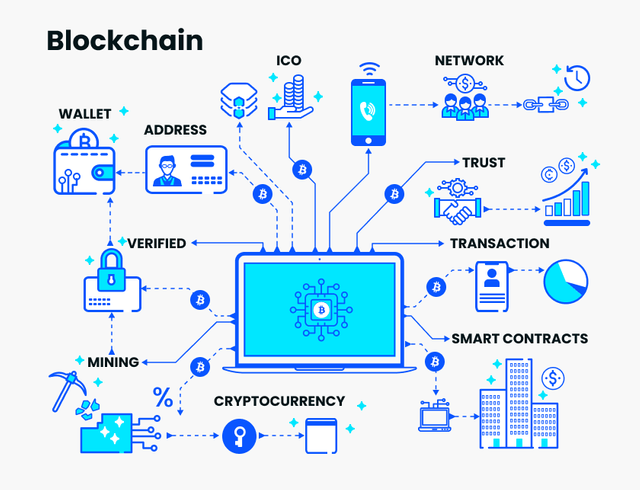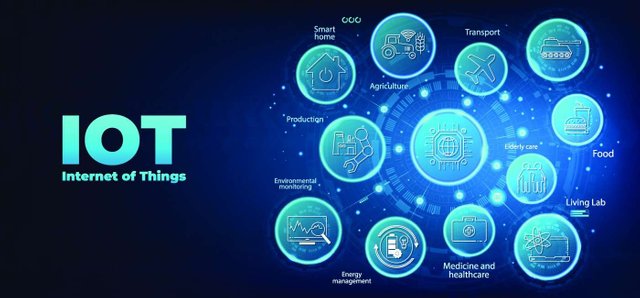Technology and innovation are continually transforming the way we live, work, and communicate with one another. We've seen an explosion in technical breakthroughs in recent years, with new and fascinating technology coming on a daily basis. In this essay, we'll look at some of the most recent technological and innovation developments, such as artificial intelligence (AI), blockchain, and the Internet of Things (IoT).
Artificial Intelligence (AI):
.jpg)
Artificial intelligence has been around for a long time, but it has recently become increasingly sophisticated and prevalent. The ability of machines to learn from data, recognise patterns, and make judgements based on that data is referred to as AI. AI has a wide range of possible applications, from chatbots and personal assistants to self-driving automobiles and sophisticated medical diagnosis.
Deep learning algorithms, which can analyse massive quantities of data to learn and improve over time, are one of the most intriguing advances in AI. Deep learning is already employed in a variety of applications, including picture and speech recognition, natural language processing, and predictive analytics.
The use of neural networks to generate more powerful algorithms is another area of AI that has seen substantial advancement in recent years. Neural networks are supposed to function similarly to the human brain, with layers of interconnected nodes capable of data analysis and processing. These networks are powering everything from voice assistants to self-driving cars.
Machine learning algorithms are being used to analyse patient data and diagnose ailments, which is another way AI is being utilised to improve healthcare. This can assist doctors in developing more accurate diagnosis and treatment regimens.
Despite the potential benefits of artificial intelligence, there are concerns about its influence on jobs and privacy. As AI advances, it has the potential to replace many occupations, particularly in industries such as transportation and manufacturing. There are also concerns regarding the privacy implications of AI, particularly in terms of data gathering and utilisation.
Blockchain:

Blockchain is a digital ledger technology that enables for the secure and transparent recording and distribution of information. Blockchain, which was originally developed for use in bitcoin, is currently being used in a variety of applications ranging from supply chain management to voting systems.
One of the most important advantages of blockchain technology is its capacity to establish secure, tamper-proof records that can be viewed by numerous parties. This makes it especially beneficial in areas that require transparency and trust, such as supply chain management. Companies may monitor things from their origin to their destination using blockchain, confirming that they are real and have not been tampered with.
Another application of blockchain is in voting systems. Votes can be securely recorded and counted using blockchain, decreasing the danger of fraud or tampering. Blockchain is also being utilised in healthcare to securely store patient data, as well as in the legal business to establish tamper-proof and self-executing digital contracts.
Despite its potential benefits, there are questions regarding blockchain scalability and energy usage. The process of creating and validating blocks in a blockchain necessitates a substantial amount of computer power, which can be costly and energy-intensive. Furthermore, there are concerns regarding blockchain environmental impact, specifically the energy consumption required for cryptocurrency mining.
Internet of Things (IoT)

The Internet of Things refers to the expanding network of linked objects, which includes everything from smartphones and smartwatches to home appliances and industrial sensors. By connecting these devices to the internet, they may communicate and share data with one another, opening up new possibilities for automation and optimisation.
Smart cities, where sensors and other connected equipment may be used to enhance anything from traffic flow to trash management, are one of the most interesting applications of IoT. City officials can make more informed judgements about how to manage resources and infrastructure by collecting data on topics like traffic patterns, air quality, and energy usage.
The Internet of Things is also being utilised to improve manufacturing operations.
Smart factories that employ sensors and connected devices to optimise productivity and decrease waste are also using IoT to improve manufacturing operations. Manufacturers can find areas for improvement and make real-time adjustments to their operations by gathering data on topics like equipment performance and product quality.
Agriculture is another application of IoT, where sensors and linked devices can be used to monitor crops and livestock. Farmers may make more educated decisions about when to water, fertilise, and harvest their crops by collecting data on soil moisture, temperature, and plant growth.
However, like with any technology, there are questions regarding the IoT's security and privacy ramifications. There is a risk of hacking and cyber attacks with so many gadgets connected to the internet, which might jeopardise important data or even physical infrastructure.
Furthermore, there are concerns that IoT will worsen existing disparities, particularly in healthcare and education. For example, if private corporations restrict access to healthcare data and only serve particular demographics, certain populations may be left behind.
Overall, the latest technological and innovative developments are interesting and have the ability to improve our lives and solve complex challenges. However, as these technologies expand, it is critical to address privacy, security, and equality concerns, as well as to guarantee that they are created and applied in a responsible and sustainable manner.
Hello @mew2.
Welcome to Steemit, I saw that you recently arrived on the platform.
On a blogging platform as big as Steemit, you run the risk of not moving forward and not getting the desired results if you do not follow the right path.
There are some basic rules to follow such as posting original content, not spamming and plagiarism, posting original photos or citing the source.
Did you know that there is the Newcomers' Community on Steemit, which helps new users to achieve basic goals step by step in order to be ready for the Steemit ecosystem?
If you are interested in learning more, I recommend you take a look at: Newcomer Guidelines for Verification and Curation you will find a lot of information that will be useful.
You may also entering some competitions organised by the various communities that's a great way to gain more visibility and make yourself known on the platform.
Try to find the contest that suits you, visiting Contest Alerts: Active Contest List.
I hope I have been a little helpful and if you have any doubts you can always ask me. ;D
Downvoting a post can decrease pending rewards and make it less visible. Common reasons:
Submit